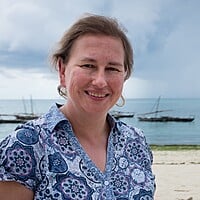Katya Popova

I am a global ocean modeller based at the National Oceanography Centre (UK) studying climate change impacts on marine ecosystems. Lead Educator for the Future Learn course “Ocean Science in Action”.
Location National Oceanography Centre, UK.
Activity
-
If such an anomalous behavior can be predicted even at a short time scale on the basis of the operational RS, there are measures the government can put in place to help coping with low catches. Agulhas Bank in South Africa and the squid fishery with its frequent crashes is another good example where high catches of squid depend on productive season in a...
-
There are multiple ways in which operational remote sensing can help fisheries. One is optimisation of the fishing strategies (directing fishing boats to be at the right time and at the right place). They key challenge is that you can only do this by proxy (oceanic fronts or elevated chlorophyll). Such a system needs local experience and knowledge of how...
-
Katya Popova made a comment
Dear Jerry, I think that yellowfin tuna this is one of those examples where the main obstacle is the lack of political will (including subsidies, licences and lack of inclusion of the key stakeholder - artisanal coastal communities, in decision making) rather than ineffective communication of research into policy. It is not our insufficient knowledge of tuna...
-
Katya Popova made a comment
We are getting very close to the end of our course. My huge thanks go to all the participants and our international team of mentors! It was an amazing experience for me, with more than 1500 learners from 102 countries. There were so many deep and challenging questions and our weekly pin-boards have a great collection of very interesting and thought-provoking...
-
You are absolutely right Alison - the issues are immensely complex and often involve a lot of conflict of interests. And your question about communication of scientific results to the policymakers is spot-on - this is probably one of the most difficult challenges of our job as scientists addressing societal challenges. There is no common approach; although the...
-
What an interesting question! Yes, quite a lot actually, however downwelling impacts are much more diverse and not necessarily all beneficial for productivity. For example a large scale downwelling in the subtropical gyres which is caused by convergence of the ocean currents is what causes formation of the plastic garbage patches (and also very low...
-
A great question Sonya! Harmful algal blooms (or HABs) are becoming more pronounced now, and there are many contributing factors. They usually occur when ecosystem is forced out of balance - for example by nutrient pollution (via riverine input of agricultural nutrients) or when a particular trophic level is removed due to e.g. fishing or when there are mixing...
-
A very interesting question Pauline. Phytoplankton is microscopic and its concentration in teh ocean are not high enough to impact its density, so it does not alter the physical properties. Although there is one exception. In very high concentrations, phytoplankton can change absorption of the short wave radiation by the upper layers and this can have some...
-
You are right Sue, fertilization of the ocean by iron has been proposed as one of the methods of geo-engineering. The idea is that in the areas where phytoplankton is limited by iron (such as Southern Ocean and some areas of the Pacific) an addition of iron can stimulate phytoplankton growth and enhance export or organic material into the deeper layers of teh...
-
Unfortunately SST doesn't work very well as a proxy for the pH. Many other factors are involved in controlling the carbon system. Ocean circulation and in particular upwelling which we will cover in the next week is one of them.
-
@RichardDennehy We are getting better and better at predicting climate change stressors in spite of the complexity of the system. Ocean and climate models made a huge progress over the last decade. However the real challenge is to predict how marine species and whole ecosystems will respond to these stressors. Climate change does not impact the ocean evenly....
-
Hi everyone, I immensely enjoyed the first week of the course! It is great to see such an amazing participation, we have learners from more than 90 countries! I was incredibly inspired by the passion and the depth of thoughts in the postings on the Padlet on ocean science and sustainability. It was great to see so many comments on the importance of the...
-
Hi Phil, This is a very interesting question (in fact two questions). Woudl you mind also posting them into the robotic padlet exercise ("Do sharks attack the robots?" - our robotics experts will comment on them - it seems like a lot of interesting questions are being discussed there).
-
Welcome to the course everyone! Great to see such a truly global team of learners. Looking forward to discussions, opinions, and questions! Our Map and the pinboard looks very interesting - try to add pictures to your posts to make it really engaging.
